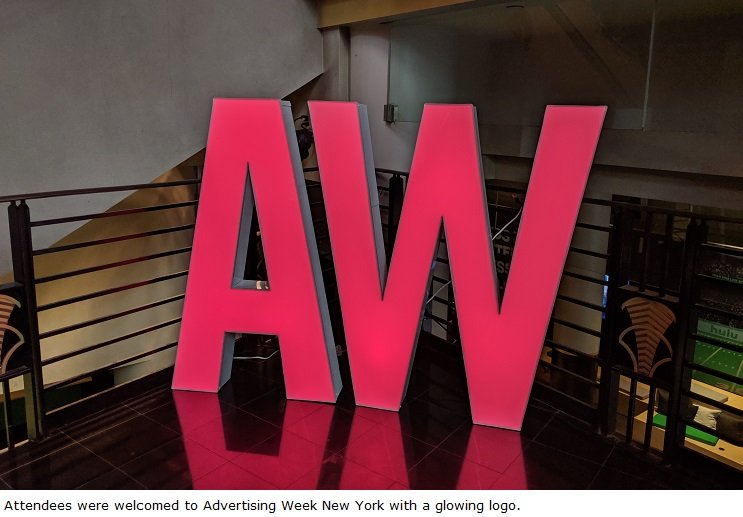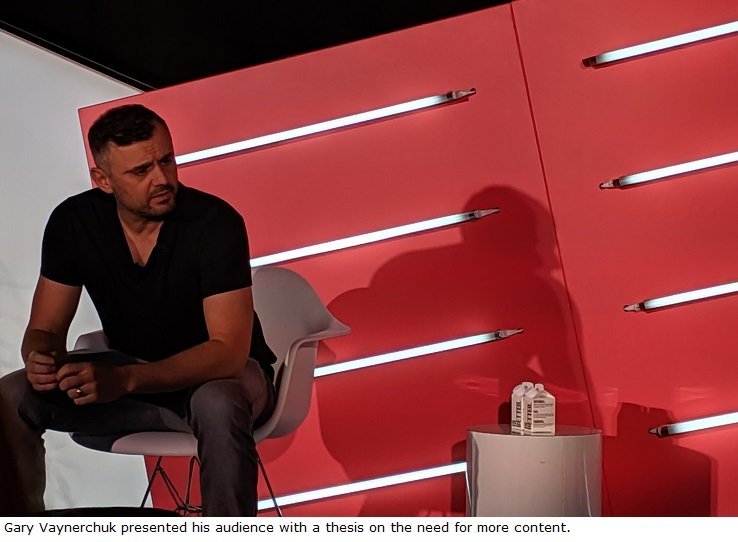Marketing Trends Shared by Industry Leaders at Advertising Week New York
 Loralyn Mears, PhDMulti-track conferences are often difficult for people to navigate. Despite the effort put into planning your schedule, FOMO (Fear of Missing Out) will creep in. You’ll worry that you’re going to miss something. An example is Advertising Week New York which is filled with industry experts, leaders and gurus which makes it challenging to select which event to attend. At any given moment, there were at least 20-25 fascinating marketers on stage presenting to captivated audiences. Here are 15 trends identified and discussed in the first two days of the conference.
Loralyn Mears, PhDMulti-track conferences are often difficult for people to navigate. Despite the effort put into planning your schedule, FOMO (Fear of Missing Out) will creep in. You’ll worry that you’re going to miss something. An example is Advertising Week New York which is filled with industry experts, leaders and gurus which makes it challenging to select which event to attend. At any given moment, there were at least 20-25 fascinating marketers on stage presenting to captivated audiences. Here are 15 trends identified and discussed in the first two days of the conference.
2019 Trends in Marketing
THE COST OF CONTENT IS RISING: We all recognize the value of good content but many of us may be surprised by the rising cost of quality material. For example, in the last few weeks, Warner Media paid $425M for the rights to Friends, Netflix paid $500M for Seinfeld and HBO is rumored to be negotiating a $1B deal to acquire Big Bang Theory.TRADITIONAL ADVERTISING NO LONGER WORKS: Prior to the availability of Skip Ad technology (which enables viewers to exit out of an advertisement after a few seconds), storytellers would slowly build momentum until they delivered the punchline. The Skip Ad feature, originally debuted by Google, puts consumers in control. Ads must now captivate customer attention out of the gate in less than 3-4 seconds.“VIDEO SEQUENCE” IS A NEW STORYTELLING TECHNIQUE: Consumers have been conditioned to view digital ads in 15-60 second increments. Marketers can schedule ad playback in a defined sequence to tell a story, essentially mimicking how a book reveals something new with each chapter. This new technique is enabling marketers to connect with their audiences despite Skip Ad technology.MICRO-INFLUENCERS ARE THE NEW BRAND AMBASSADORS: The need for brands to be authentic was identified nearly 20 years ago but it’s taken that long to go mainstream. Big brands are shifting away from high-gloss videos starring celebrities and produced by agencies. Enter the era of the micro-influencer (typically with 30-50,000 followers) who is producing raw content that is more relatable to consumers.CUSTOMERS ARE WILLING TO GIVE YOU THEIR DATA: Research proves that some customers are comfortable with giving up their data and privacy if it offers them personalization or customization about matters that are relevant to them. This includes finances, purchasing recommendations, streaming entertainment options, health and so on. However, their tolerance for intrusion and disruption by ads is low which imposes limits on the amount of advertising.ACCOUNTABILITY IS COMING: According to the speakers, the influencer marketplace is reaching maturity which will drive greater performance metrics reporting and accountability. Metrics will expand beyond the numbers of followers and views into the level of engagement. Technology enables marketers to specifically pinpoint the moment in time that a consumer exits out of a digital ad which can inform future content. Influencers are beginning to see the effects of an accountable world. For example, cosmetics influencer, James Charles, recently saw his viewership cut in half once his audience realized he made a deal with the competitor of his sponsor.  SHOPPABLE CONTENT IS BEING PAIRED WITH CONVERSION TECHNOLOGY: Brands are going directly to consumer via Over The Top (OTT) internet streaming media services, bypassing satellite, broadcast, cable and other traditional television platforms. Technology enables sales conversion, complete with 1-click payment and delivery which is driving the increase in ads with shoppable content.BIG BRANDS HAVE BECOME REACTIVE: Once the champions of long-term strategic planning, big brands are now questioning everything. They act immediately.ADVERTISING ON TV IS DYING A SLOW DEATH: Brands are pulling out of TV and reallocating their advertising dollars to micro- and macro-influencers. Although display advertising and TV are losing market share, their reach is still enormous. TV ads aren’t going to die anytime soon but the end is in sight.FULL-SERVICE AGENCIES ARE MAKING A COMEBACK: For nearly a decade, uber-specialization has been the modus operandi of most agencies. Creatives operated independently of the media while they liaised with analytics vendors to procure and interpret data. Once again, full-service agencies are on the rise again offering both media and creative services with data analytics at the center of their offering.HOMOGENIZATION IS HAPPENING: This is “an ugly trend” according to the speakers. Uniformity is “dull” and is emerging as a macro trend with cultures slowly being assimilated. That macro trend is impacting our feeds: we’re seeing the same types of ads and imagery across all platforms. For an example, look at Instagram where the photos are beginning to look the same.VIDEO IS GOING HIGH TECH: Augmented Reality (AR) and Virtual Reality (VR) are being combined with video. Consumers are getting an increasingly personalized experience with immersive technology. In terms of platforms, TikTok has unleashed new expressions of creativity. Videos have been proven to drive engagement more than text.SONIC AND SOUND ICONOGRAPHY HAS ARRIVED: With voice technology, home systems and AI-enabled mobile assistance, sonic and sound iconography are new tools at the disposal of marketers. Voice hasn’t had the growth expected, potentially due to how it excludes the hearing-impaired. Once gestural languages and devices that can interpret them advance, voice and sound iconography will be omnipresent. Intel was among the first to leverage sound as part of its brand, infusing four tones into its logo. Last week, Mastercard unveiled their new sound iconography which will be part of every ad. Every time that a consumer swipes their credit card, the point of sale device will play its melody to reinforce the brand.PRIVACY IS GETTING PERSONAL: Within the marketing industry, consumers are frustrated by the legal-ease of extensive data privacy contracts and simply want to check the box, “ You cannot sell my data.” But it’s not that simple. People are now personally setting the course for privacy via self-agency. People are no longer randomly posting what they’re doing throughout the day. Instead, they are publishing content selectively and more strategically, defining their identity and personal brand through more thoughtful posts. Collectively, “young adults are retreating from social media” to the privacy of closed group chats to stay connected in micro groups.VISUAL LISTENING HAS ARRIVED: Today, about three-quarters of all conversations are visual. People are using photos and images to express themselves. Can you hear what my photos are saying? Brands are developing tools to addres this question, designing algorithms to "listen" to photos, find patterns and interpret the meaning behind the visual dialogue. With growing precision, marketers can now apply AI to visually analyze the daily lives of its target audience customers more specifically.Advertising Week is a one-of-a-kind event. With nearly 100,000 attendees, 300 events and over 1,200 speakers, there is much to learn and be gained.
SHOPPABLE CONTENT IS BEING PAIRED WITH CONVERSION TECHNOLOGY: Brands are going directly to consumer via Over The Top (OTT) internet streaming media services, bypassing satellite, broadcast, cable and other traditional television platforms. Technology enables sales conversion, complete with 1-click payment and delivery which is driving the increase in ads with shoppable content.BIG BRANDS HAVE BECOME REACTIVE: Once the champions of long-term strategic planning, big brands are now questioning everything. They act immediately.ADVERTISING ON TV IS DYING A SLOW DEATH: Brands are pulling out of TV and reallocating their advertising dollars to micro- and macro-influencers. Although display advertising and TV are losing market share, their reach is still enormous. TV ads aren’t going to die anytime soon but the end is in sight.FULL-SERVICE AGENCIES ARE MAKING A COMEBACK: For nearly a decade, uber-specialization has been the modus operandi of most agencies. Creatives operated independently of the media while they liaised with analytics vendors to procure and interpret data. Once again, full-service agencies are on the rise again offering both media and creative services with data analytics at the center of their offering.HOMOGENIZATION IS HAPPENING: This is “an ugly trend” according to the speakers. Uniformity is “dull” and is emerging as a macro trend with cultures slowly being assimilated. That macro trend is impacting our feeds: we’re seeing the same types of ads and imagery across all platforms. For an example, look at Instagram where the photos are beginning to look the same.VIDEO IS GOING HIGH TECH: Augmented Reality (AR) and Virtual Reality (VR) are being combined with video. Consumers are getting an increasingly personalized experience with immersive technology. In terms of platforms, TikTok has unleashed new expressions of creativity. Videos have been proven to drive engagement more than text.SONIC AND SOUND ICONOGRAPHY HAS ARRIVED: With voice technology, home systems and AI-enabled mobile assistance, sonic and sound iconography are new tools at the disposal of marketers. Voice hasn’t had the growth expected, potentially due to how it excludes the hearing-impaired. Once gestural languages and devices that can interpret them advance, voice and sound iconography will be omnipresent. Intel was among the first to leverage sound as part of its brand, infusing four tones into its logo. Last week, Mastercard unveiled their new sound iconography which will be part of every ad. Every time that a consumer swipes their credit card, the point of sale device will play its melody to reinforce the brand.PRIVACY IS GETTING PERSONAL: Within the marketing industry, consumers are frustrated by the legal-ease of extensive data privacy contracts and simply want to check the box, “ You cannot sell my data.” But it’s not that simple. People are now personally setting the course for privacy via self-agency. People are no longer randomly posting what they’re doing throughout the day. Instead, they are publishing content selectively and more strategically, defining their identity and personal brand through more thoughtful posts. Collectively, “young adults are retreating from social media” to the privacy of closed group chats to stay connected in micro groups.VISUAL LISTENING HAS ARRIVED: Today, about three-quarters of all conversations are visual. People are using photos and images to express themselves. Can you hear what my photos are saying? Brands are developing tools to addres this question, designing algorithms to "listen" to photos, find patterns and interpret the meaning behind the visual dialogue. With growing precision, marketers can now apply AI to visually analyze the daily lives of its target audience customers more specifically.Advertising Week is a one-of-a-kind event. With nearly 100,000 attendees, 300 events and over 1,200 speakers, there is much to learn and be gained.
 About the Author: Loralyn Mears, PhD is a freelance marketer and columnist focused on telling the story of entrepreneurs, their startups and their technology.
About the Author: Loralyn Mears, PhD is a freelance marketer and columnist focused on telling the story of entrepreneurs, their startups and their technology.